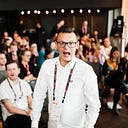When impossible became normal.
A story about the price of possibility.
I never told my friends about the crab stick smell that followed me home each morning. How could I explain that this artificial seafood scent was my personal perfume of progress? Back home in Lithuania in ’99, where PhDs worked as security guards and engineers drove taxis, the idea of a teenager choosing factory work seemed absurd, when even the most qualified adults scrambled for any job they could find.
But Wisconsin changed everything. Not New York, not Los Angeles, not any of the glittering cities I’d dreamed of when imagining my school exchange year. Instead, fate dropped me into a town smaller than my own in Wisconsin, where I stumbled onto a lesson I never saw coming.
It was there I first witnessed the strange sight of teenagers behind cash registers and burger grills, wearing their part-time jobs like badges of independence rather than marks of necessity. Back in Lithuania, still shaking off eight years of independence from the Soviets, the idea of choosing to work at sixteen felt as alien as free refills and drive-through banking.
These American kids worked to buy their first cars, to save for college, to fund their weekend adventures. They wrote their own stories while my peers back home waited for permission to begin theirs.
That realisation stuck with me all the way home: you didn’t have to wait for opportunity to find you. So I walked into that crab stick factory with something that small Wisconsin town had awakened in me. Two days on, two days off, two nights on, two nights off. Twelve-hour shifts that bent time until reality blurred at the edges.
In the strange liminal space between day and night shifts, between childhood and adulthood, between post-Soviet constraint and newfound freedom, I learned something essential about pride. Though by summer’s end, my world blurred with fluorescent lights burning behind my eyelids even in darkness. The endless rhythm of the conveyor belt wrote itself into my dreams. Sometimes, in those pre-dawn hours when time felt liquid, I’d stare at the crab sticks and wonder if they were real or if my mind had finally cracked from switching between day and night every 48 hours. I was very tired. Tired but proud.
A few years later I found myself in northern England. Different factory, different conveyor belt, this time making chocolate cornflakes. That Wisconsin lesson was about to prove its worth again. Seven miles from my bed, through winter darkness and suspicious glares at my Eastern European accent. No bus service, no friendly offers of rides. So I walked those seven miles to the interview, Wisconsin pride warming me against the English winter.
They hired me, how could they not? The person who walks seven miles through winter for an interview carries something that can’t be written on a resume. I bought a bike for fifty quid, pedalled fourteen miles round trip every day through darkness, rain, and freezing wind. Four days on, four days off, four nights on, four nights off. Then six days instead of four, because every extra shift meant getting closer to something better.
It wasn’t the kind of pride that came from job titles or diplomas. It was the pride of choosing your path when everyone else was waiting for theirs to be chosen for them. The pride of understanding that sometimes the most valuable education happens under fluorescent lights at 3 AM, watching artificial crab meat roll down a conveyor belt, or pedalling through northern England’s winter darkness.
That tiny Wisconsin town had taught me that opportunity doesn’t always wear the face we expect. Sometimes it smells like fake seafood. Sometimes it means taking the kind of job others think is beneath them. Sometimes it means being the only seventeen-year-old who can tell morning by the end of a night shift rather than the ring of an alarm clock. Sometimes it means cycling seven miles with frozen fingers gripping handlebars, because you know something better waits on the other side of those shifts.
Years later, I still catch myself smiling when I see fake seafood in the frozen section. Those twelve-hour shifts bent reality until it cracked, and something inside me shifted forever. Now I measure distance in determination — seven miles to an interview, fourteen miles on a rusty bike through English winter. I count mornings not by sunrise but by the end of night shifts, and opportunity by the paths most people pretend not to see.
And every now and then, when I meet someone young who’s chosen an unexpected path, I catch a glimmer of that same quiet pride in their eyes. And I know they understand that some lessons can only be learned on the night shift, in the space between what others expect and what you know you can endure.
Hi, I’m Mindaugas. I’m the founder of Coho building a product to help design leaders solve the problems no one talks about — through deeply curated private chat groups. We’re currently in alpha access, with lead, principal, staff, manager, head of and director level designers from Hubspot, Meta, and OpenTable, Udio and more helping us build it from the ground up. Next wave of access is in January.
For the last 10 years I’ve been helping designers navigate their careers. First as a design recruiter, then design community builder at companies like InVision and On Deck and now as someone who creates deeply curated masterminds/peer groups.
I’m based in the Portuguese countryside with my two rescue dogs, Rina and Mya.
I sometimes host free layoff/career navigation support office hours. The format is small groups, max 5 people at a time to create a safe space for folks to help each other out and I share some learnings and tips from talking to a lot of professionals dealing with layoffs and extended job search periods. Book a spot here. They are free.
